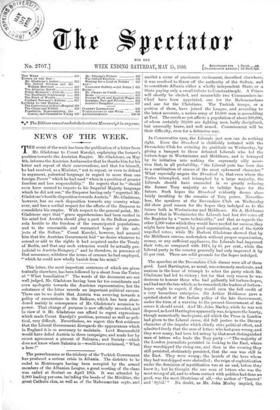The speeches at the Devonshire Club dinner were all of
them good. Lord Hartington, as usual, was extremely moderate, and anxious in the hour of triumph to sober the party which Mr. Gladstone had led to victory; but for that very reason he was desirous to honour those who had gallantly led forlorn-hopes, and had met the fate which, as he remarked, the leaders of forlorn- hopes ought to expect, if they would earn the full credit of a very hazardous enterprise. Sir Arthur Hobhouse gave a spirited sketch of the Indian policy of the late Government, under the form of a warning to the present Government of the errors it should avoid. And Mr. John Morley, while he was not disposed, as Lord Hartington apparently was, to ignore the hearty, though numerically inadequate, aid which the Press in London had given to the Liberal cause, did full justice to the literary character of the impulse which chiefly stirs political effort, and admitted freely that the men of letters who had gone wrong, and they were many, had been led astray by that most distinguished man of letters who leads the Tory party :—" The majority of the London journalists persisted in looking to the East, where they worshipped the rising sun, and then in the evening they still persisted, obstinately persisted, that the sun was still in the East. They were wrong; the laurels of the hero whom they had worshipped were shrivelled ; the reign of sophistication under the dominion of mystification was at an end, before they knew it; but he thought the one man of letters who was the most wrong of all, and to whom contact with politics had done no good, was the most illustrious of all,—the author of Tancred! and Sybil." No doubt, as Mr. John Morley implied, the
wonderful success of Lord Beaconsfield in perverting men of letters is a great testimony to the power of literary genius ; but it is a great testimony also to the flexibility and weakness of the purely literary mind, where there is no genius in possession of it.



































 Previous page
Previous page